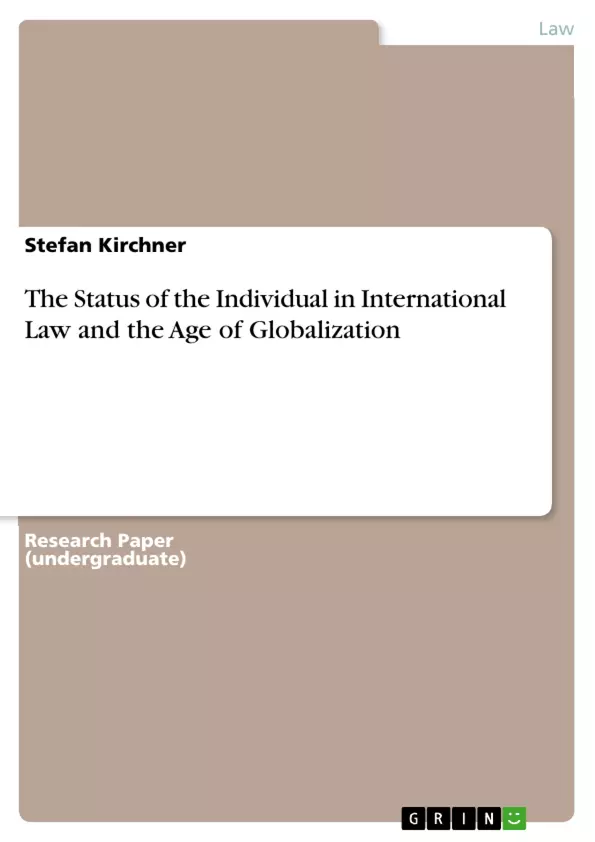Globalization is not a new phenomenon. Already before, there have been times of increased economic, cultural and political interaction, but also competition, for example during the 17th century when the English and Dutch East India companies heralded a phase of dominance for Northwestern Europe or in the 15th and 16th centuries, when Spain and Portugal colonized what is today Latin America.
What is new today is the degree to which globalization affects the everyday lives of people around the world. One can compare today’s era of globalization with the years immediately after the re-discovery of the Americas in 1492 as well as with other phases of increased globalization. While some challenges differ, some are essentially still the same. The key question raised by globalization is how to treat the other.
This is the question which is behind all other questions, for example whether precedence should be given to the protection of the environment or free enterprise or the question which role NGOs can play in the legal process. In other words: what is the position of the individual in the international legal process? The question is answered by looking at international law and historic parallels to the current age of globalization.
Inhaltsverzeichnis (Table of Contents)
- I. Introduction: Globalization - Now and Then.
- II. Heritage: The status of the individual during the Iberian phase of Globalization and the contribution of the School of Salamanca.
- 1. The principle: Mediation of the individual through the state.
- 2. Human Rights Law: A step forward – but not enough.
- 3. Rights: Spillover effects from self-contained human rights regimes into general PIL and other regimes.
- 4. Rights - but no Standing: The Right to Contact a Consular Official under the Vienna Convention on Consular Relations...
- 5. Conclusions.
- III. Today: Almost beyond Westphalia?
- IV. Future: One World
- V. Concluding remarks
Zielsetzung und Themenschwerpunkte (Objectives and Key Themes)
This article explores the evolving role of the individual in international law within the context of globalization. The author analyzes historical precedents, particularly the contributions of the School of Salamanca, and examines the current state of affairs regarding the individual's position in international legal processes.
- The impact of globalization on the individual's participation in legal processes
- The historical legacy of the School of Salamanca and its influence on international law
- The challenges of reconciling the principle of state sovereignty with the protection of individual rights
- The role of human rights law in shaping the status of the individual in international law
- The future of the individual in a globalized world
Zusammenfassung der Kapitel (Chapter Summaries)
- Introduction: Globalization - Now and Then. This chapter introduces the concept of globalization and its various dimensions, with a focus on the communicative aspect. It compares past periods of globalization with the present era, highlighting the increasing impact of globalization on individuals' lives.
- Heritage: The status of the individual during the Iberian phase of Globalization and the contribution of the School of Salamanca. This chapter examines the work of Francisco de Vitoria, a Dominican friar from the School of Salamanca, who addressed the question of how to treat native populations during the colonization of the Americas. It highlights Vitoria's concept of a global community and his arguments for individual rights, including freedom of religion, speech, trade, and travel. It also discusses the influence of the School of Salamanca on the development of international law.
- Today: Almost beyond Westphalia? This chapter explores the current status of the individual in international law. It examines the principle of state mediation, the role of human rights law, and the spillover effects of human rights regimes into general international law. It also discusses the issue of standing for individuals in international law, using the example of the right to contact a consular official under the Vienna Convention on Consular Relations.
Schlüsselwörter (Keywords)
This article explores the key concepts of globalization, international law, individual rights, human rights, the School of Salamanca, Francisco de Vitoria, state sovereignty, and the evolving relationship between states and individuals in a globalized world. It also touches upon the role of international organizations, the impact of human rights law, and the future of the individual in a globalized context.
Frequently Asked Questions
How has the status of the individual in international law changed?
Historically, only states were subjects of international law. Today, individuals have gained significant rights and, in some cases, standing before international tribunals, especially in human rights law.
What was the contribution of the School of Salamanca to international law?
The School of Salamanca, led by figures like Francisco de Vitoria, argued for the fundamental rights of all humans, regardless of their religion or origin, laying the groundwork for modern human rights.
Does globalization affect individual legal standing?
Yes, globalization increases transborder interactions, leading to a need for individuals to have direct access to international legal protections beyond their own state's mediation.
What is the "mediation of the individual through the state"?
This is the traditional principle that an individual can only claim international rights through their home state, which acts on their behalf against other states.
What role do NGOs play in the international legal process?
NGOs act as advocates for individual and collective rights, often participating in international forums and influencing the development of new legal norms.
- Quote paper
- Stefan Kirchner (Author), 2015, The Status of the Individual in International Law and the Age of Globalization, Munich, GRIN Verlag, https://www.grin.com/document/313126



